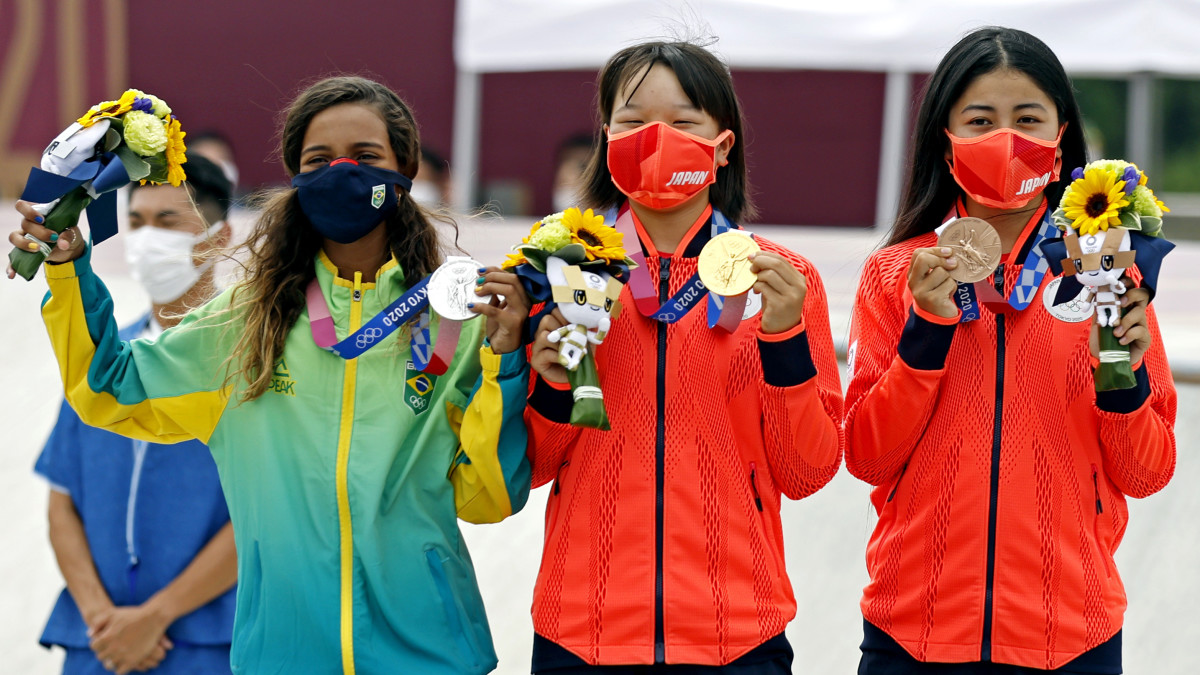Women's Skateboarding Debut Exemplifies Progress in Sport: 'Girls Can Skateboard'

TOKYO — Many of the competitors in Monday’s women’s street skateboarding event—the sport’s Olympic debut—spoke about how they hope to inspire a generation of girls to try skateboarding. In some cases, that generation was here, in Tokyo, skating alongside them.
Fully half the field could have been in summer camp instead of the Summer Olympics, including all three medalists. Gold medalist Momiji Nishiya, of Japan, is 13, as is silver medalist Rayssa Leal, of Brazil. Bronze medalist Funa Nakayama, of Japan, is 16, as is Wenhui Zheng, of China, who finished sixth.
They did not feel they needed to be inspired. They seemed surprised at even the idea.
“Girls can skateboard,” said Nishiya.
“There is no gender barrier in sports,” said Leal.
When many of the older skaters were their age, they were fighting for those very ideas. Leticia Bufoni, 28, of Brazil, who has five X Games gold medals and missed the final here by one spot, said, “Convincing my dad [to let me skate] was harder than getting to the Olympics.”

She became obsessed with skateboarding as an elementary schooler. She would grab her board and run to the backyard, where she would hold onto the gate with both hands and practice tricks. But her father believed skateboarding was just for boys, and he forbade her. She didn’t listen. Finally, when she was 10, he snapped her board in half. She cried for hours. “And then the next day I asked my friend for a new board and I started to skate again,” she said. “My dad was just like, ‘Well, there’s nothing I can do.’ " He started taking her to the skate park himself.
“We get a lot of messages on social media from young girls that start skating because we skate,” she said. “I just try to be the inspiration that I didn’t have when I started skating. When I started skating, I had no one I could show my dad.”
The dearth of women skaters was compounded by a dearth of publicity. That, too, might be changing. “I think for so long the industry has really ignored females and given us no spotlight,” said Alexis Sablone, 34, of the U.S., who has three X Games gold medals and finished fourth here. “You don’t see women on the covers of magazines, and sponsors aren’t paying women. So I think this has given the females in skateboarding a platform that can’t really be ignored. There’s a podium. Suddenly the industry will start paying attention. … I wish it hadn’t taken this to legitimize us, but it’s a step in that direction.”
The most obvious evidence of progress is the teenage medalists. These are athletes who could be playing soccer or tennis but instead chose skateboarding.
“Female skateboarders have reached the critical mass,” Sablone said. “There’s enough that there will be prodigies, and they’re here, and they’re gonna show all the other girls what’s possible.”
In the meantime, the women see more obstacles to overcome. In addition to the talent pool and the publicity, the scoring can be a challenge. Women’s and men’s skateboarding are scored on the same scale, and the men’s best tricks tend to be more powerful than the women’s, so the women’s figures are notably lower. “It kind of makes us look bad,” Sablone said. “I’m sure sitting at home, when you see guys get 9.9s and then you’re seeing us get 0.8s—it is what it is.” She suggested some sort of multiplier to make the numbers more comparable.
But that might become moot soon. “The women are progressing so quick that it’s hard to set that bar,” she said. “From contest to contest, people are doing tricks that you didn’t see them do a month before.” All this visibility will only improve the level of the competition. Sablone dreams of a 2024 Olympics, packed with talented young female skateboarders, with herself watching from the sideline.
At least one of those talented young female skateboarders had more pressing concerns on her mind. Leal, the 13-year-old silver medalist, grinned when she thought about what her performance meant. “Now I can convince all my friends to skateboard everywhere with me!” she said.
More Olympics Coverage:
